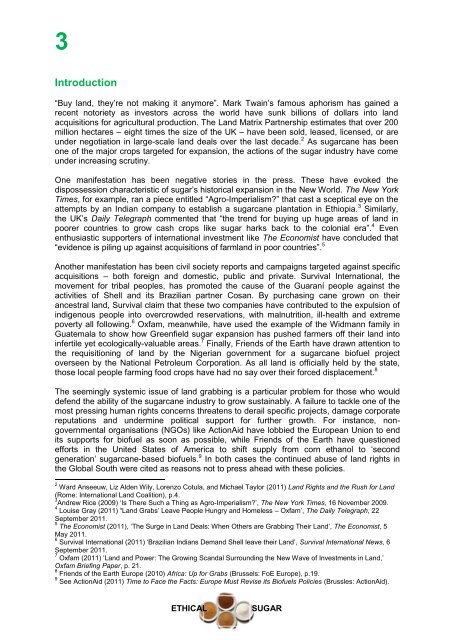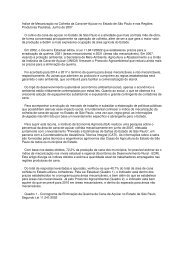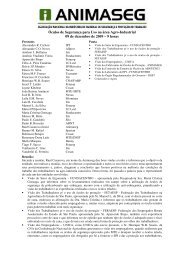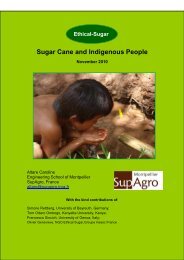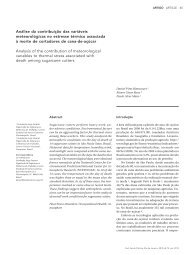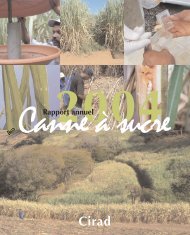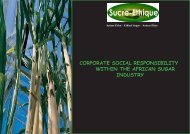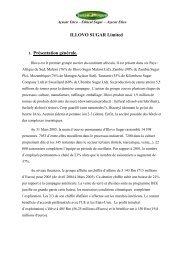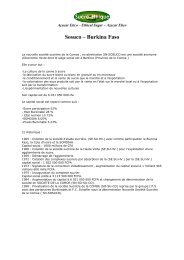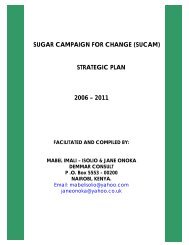August 2012 Sugarcane and the global land grab: A ... - Sucre Ethique
August 2012 Sugarcane and the global land grab: A ... - Sucre Ethique
August 2012 Sugarcane and the global land grab: A ... - Sucre Ethique
You also want an ePaper? Increase the reach of your titles
YUMPU automatically turns print PDFs into web optimized ePapers that Google loves.
3Introduction“Buy l<strong>and</strong>, <strong>the</strong>y’re not making it anymore”. Mark Twain’s famous aphorism has gained arecent notoriety as investors across <strong>the</strong> world have sunk billions of dollars into l<strong>and</strong>acquisitions for agricultural production. The L<strong>and</strong> Matrix Partnership estimates that over 200million hectares – eight times <strong>the</strong> size of <strong>the</strong> UK – have been sold, leased, licensed, or areunder negotiation in large-scale l<strong>and</strong> deals over <strong>the</strong> last decade. 2 As sugarcane has beenone of <strong>the</strong> major crops targeted for expansion, <strong>the</strong> actions of <strong>the</strong> sugar industry have comeunder increasing scrutiny.One manifestation has been negative stories in <strong>the</strong> press. These have evoked <strong>the</strong>dispossession characteristic of sugar’s historical expansion in <strong>the</strong> New World. The New YorkTimes, for example, ran a piece entitled “Agro-Imperialism?” that cast a sceptical eye on <strong>the</strong>attempts by an Indian company to establish a sugarcane plantation in Ethiopia. 3 Similarly,<strong>the</strong> UK’s Daily Telegraph commented that “<strong>the</strong> trend for buying up huge areas of l<strong>and</strong> inpoorer countries to grow cash crops like sugar harks back to <strong>the</strong> colonial era”. 4 Evenenthusiastic supporters of international investment like The Economist have concluded that“evidence is piling up against acquisitions of farml<strong>and</strong> in poor countries”. 5Ano<strong>the</strong>r manifestation has been civil society reports <strong>and</strong> campaigns targeted against specificacquisitions – both foreign <strong>and</strong> domestic, public <strong>and</strong> private. Survival International, <strong>the</strong>movement for tribal peoples, has promoted <strong>the</strong> cause of <strong>the</strong> Guaraní people against <strong>the</strong>activities of Shell <strong>and</strong> its Brazilian partner Cosan. By purchasing cane grown on <strong>the</strong>irancestral l<strong>and</strong>, Survival claim that <strong>the</strong>se two companies have contributed to <strong>the</strong> expulsion ofindigenous people into overcrowded reservations, with malnutrition, ill-health <strong>and</strong> extremepoverty all following. 6 Oxfam, meanwhile, have used <strong>the</strong> example of <strong>the</strong> Widmann family inGuatemala to show how Greenfield sugar expansion has pushed farmers off <strong>the</strong>ir l<strong>and</strong> intoinfertile yet ecologically-valuable areas. 7 Finally, Friends of <strong>the</strong> Earth have drawn attention to<strong>the</strong> requisitioning of l<strong>and</strong> by <strong>the</strong> Nigerian government for a sugarcane biofuel projectoverseen by <strong>the</strong> National Petroleum Corporation. As all l<strong>and</strong> is officially held by <strong>the</strong> state,those local people farming food crops have had no say over <strong>the</strong>ir forced displacement. 8The seemingly systemic issue of l<strong>and</strong> <strong>grab</strong>bing is a particular problem for those who woulddefend <strong>the</strong> ability of <strong>the</strong> sugarcane industry to grow sustainably. A failure to tackle one of <strong>the</strong>most pressing human rights concerns threatens to derail specific projects, damage corporatereputations <strong>and</strong> undermine political support for fur<strong>the</strong>r growth. For instance, nongovernmentalorganisations (NGOs) like ActionAid have lobbied <strong>the</strong> European Union to endits supports for biofuel as soon as possible, while Friends of <strong>the</strong> Earth have questionedefforts in <strong>the</strong> United States of America to shift supply from corn ethanol to ‘secondgeneration’ sugarcane-based biofuels. 9 In both cases <strong>the</strong> continued abuse of l<strong>and</strong> rights in<strong>the</strong> Global South were cited as reasons not to press ahead with <strong>the</strong>se policies.2 Ward Anseeuw, Liz Alden Wily, Lorenzo Cotula, <strong>and</strong> Michael Taylor (2011) L<strong>and</strong> Rights <strong>and</strong> <strong>the</strong> Rush for L<strong>and</strong>(Rome: International L<strong>and</strong> Coalition), p.4.3 Andrew Rice (2009) ‘Is There Such a Thing as Agro-Imperialism?’, The New York Times, 16 November 2009.4 Louise Gray (2011) “L<strong>and</strong> Grabs’ Leave People Hungry <strong>and</strong> Homeless – Oxfam’, The Daily Telegraph, 22September 2011.5 The Economist (2011), ‘The Surge in L<strong>and</strong> Deals: When O<strong>the</strong>rs are Grabbing Their L<strong>and</strong>’, The Economist, 5May 2011.6 Survival International (2011) ‘Brazilian Indians Dem<strong>and</strong> Shell leave <strong>the</strong>ir L<strong>and</strong>’, Survival International News, 6September 2011.7 Oxfam (2011) ‘L<strong>and</strong> <strong>and</strong> Power: The Growing Sc<strong>and</strong>al Surrounding <strong>the</strong> New Wave of Investments in L<strong>and</strong>,’Oxfam Briefing Paper, p. 21.8 Friends of <strong>the</strong> Earth Europe (2010) Africa: Up for Grabs (Brussels: FoE Europe), p.19.9 See ActionAid (2011) Time to Face <strong>the</strong> Facts: Europe Must Revise its Biofuels Policies (Brussles: ActionAid).EthiclETHICALSUGAR


